On Super Tuesday, candidates were declared winners or losers according to the delegate count. Both Clinton and Trump have won a lion’s share of the states, and are poised to expand their lead in the delegate races. Lost in all the excitement is a little known fact. There might be a delegate count—it’s just that there are virtually no actual people chosen yet to serve as delegates and there won’t be very many for a while. In fact, at this point in time, there are mostly phantom delegates. Understanding this is critical to understanding why this wild election year may get wilder still—especially on the Republican side.
Here’s what most reports tell you: after each state’s primaries, its delegates are awarded according to its particular formula. As of today 728 Republican delegates have been awarded to presidential candidates and 1015 Democratic delegates have been awarded to presidential candidates. (This doesn’t count the super delegates or delegates from territories in either party.) But out of those on the Democratic side, only 35 district level delegates in Alabama are real people and only 16 district delegates in New Hampshire are real people. On the Republican side only 29 district delegates in Alabama and 17 district delegates in New Hampshire are real people. That’s because these delegates are elected on the primary ballot along with the presidential candidates.
The remaining delegates awarded thus far will be elected in April, May and June in a variety of party caucuses, conventions and state executive committees. Generally these meetings are held long after the presidential campaigns have left town. For instance, take the all-important Iowa caucuses which took place on February 1st; Republicans won’t elect the first delegates there until April 9 and Democrats won’t elect theirs until April 30. Or consider the big prize from the Super Tuesday contest: Texas. Democrats there won’t actually elect the delegates who go to Philadelphia until June and Republicans won’t elect the delegates who go to Cleveland until May.
The following chart illustrates the timeline of selecting actual delegates in both parties.
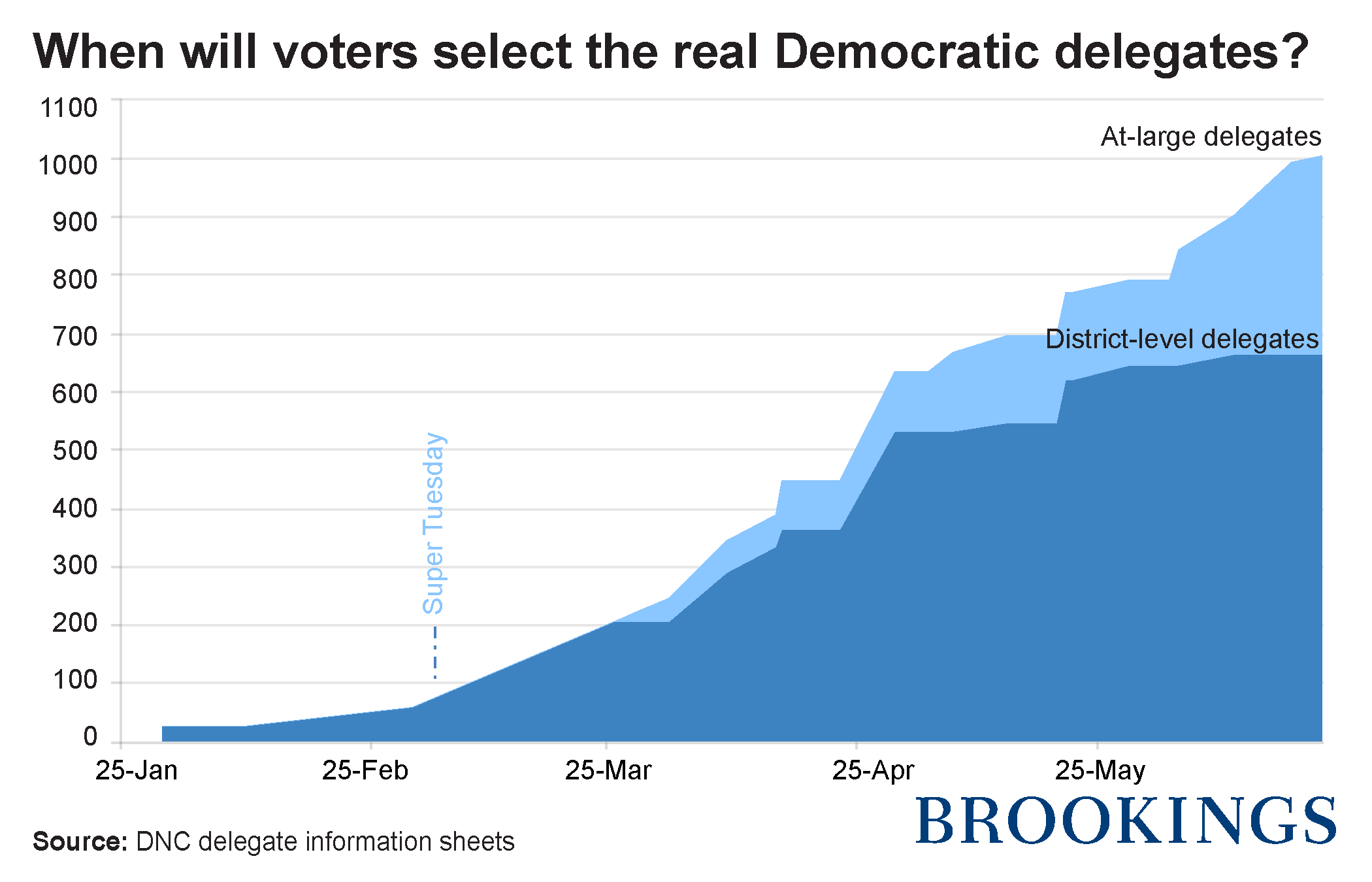
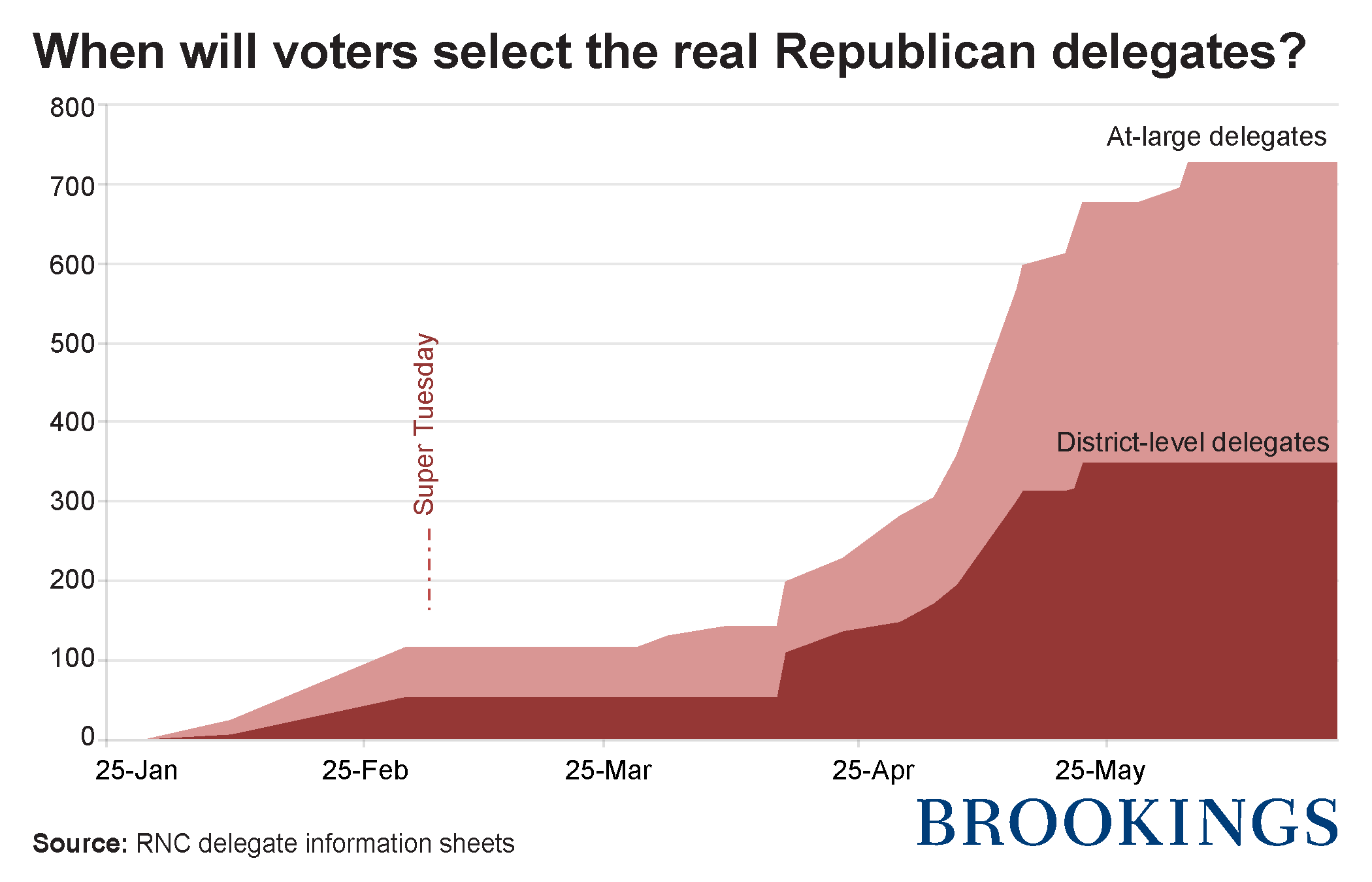
If you’ve stuck with this wonky explanation so far you may be wondering—“So what?” That’s a good question in an ordinary year. In an ordinary year, the delegates representing the presidential candidates are party activists who go to their conventions, don stupid elephant or donkey hats, and cheer for the television cameras on cue.
But this is no ordinary year for either party. Bernie Sanders may not end up with enough delegates to prevent Hillary Clinton from a first ballot nomination. But he will probably stay in the race longer than a losing candidate typically would and may have enough delegates to try and force Hillary Clinton farther to the left on platform issues than she’d rather go.
But, of course, the Republican side is really interesting. In the week leading up to Super Tuesday the Republican Party was in a full scale panic. Some of its leaders, such as Governor Chris Christie of New Jersey, bowed to what they felt was inevitable by endorsing Trump. Others such as Senate Majority Leader Mitch McConnell told colleagues we will dump Trump “like a hot rock” if he threatens their reelection.
And that’s why the identity of these yet-to-be-selected delegates matters so much. Most of the people who get elected to national conventions are party regulars and party activists. Some are ideologues but most, even the ideologues, have deep ties to the party. If Trump keeps up his venomous attacks on just about everyone all the way until June, and if party leaders at the state and local level worry that Trump at the top of the ticket will take down the rest of the Republican party, there could emerge an “Anybody but Trump” (ABT) movement in Cleveland which could lead to a possible brokered convention.
Then things would get really interesting. Two factors could lead to a scenario where no one has enough votes to get a first ballot nomination. At the last Republican convention in 2012 some party leaders tried to pass a rule allowing presidential candidates to approve the people who want to go to the convention representing them. (Democrats have a rule called “candidate right of approval” that allows presidential candidates to sanction delegate candidates.) The Republicans considered a version of this rule as a result of their experience in 2012 when supporters of Ron Paul filed for and won delegate slots belonging to Mitt Romney. Nonetheless, in 2012 the rule failed to be approved. Although there weren’t enough Ron Paul delegates to make much trouble in Tampa four years ago—one can imagine people who are “traditional” Republicans running for and winning delegate slots belonging to Trump this year especially given the fact that Trump does not have deep grass-roots ties in the GOP.
On the other hand, Republicans did pass a rule that binds delegates at least on the first ballot. Party Rule 16 a (2) that as follows:
“If any delegate bound by these rules, state party rule or state law to vote for a presidential candidate at the national convention demonstrates support under Rule 40 for any person other than the candidate to whom he or she is bound, such support shall not be recognized. Except as provided for by state law or state party rule, no presidential candidate shall have the power to remove a delegate.”
While this rule binds the delegates on the first ballot: it is unclear what would actually happen on the floor of the convention if some Trump delegates decided to vote for someone else. One expert anticipates that the convention chair would simply announce the results for each state according to the winners of the primaries or caucuses in that state—even if there were unfaithful delegates on the floor.
On the other hand, most of what political parties do has been protected by the Supreme Court under the First Amendment right of association. Thus parties can change their rules at the convention. This usually happens in an early “test vote.” In 1980 the Democrats did just that and over the same issue. Senator Ted Kennedy tried to prevent President Jimmy Carter from getting a first ballot nomination. He called a similar rule to the Republican rule 16 a(2) the “robot rule” and waged one hell of a fight over it. He lost—but so did the Democrats.
America’s two major political parties haven’t had a brokered convention (one that went beyond the first ballot) since the middle of the last century. In 1948 the Republicans took three ballots to nominate Thomas Dewey and in 1952 the Democrats took three ballots to nominate Adlai Stevenson. When it comes to the nominating convention where there’s a will there’s a way. Super Tuesday’s delegate count is important but it is by no means definitive. Donald Trump has introduced an unprecedented amount of drama into this election season. And it may continue. As Yogi Berra used to say, “It’s not over until it’s over.”
The Brookings Institution is committed to quality, independence, and impact.
We are supported by a diverse array of funders. In line with our values and policies, each Brookings publication represents the sole views of its author(s).

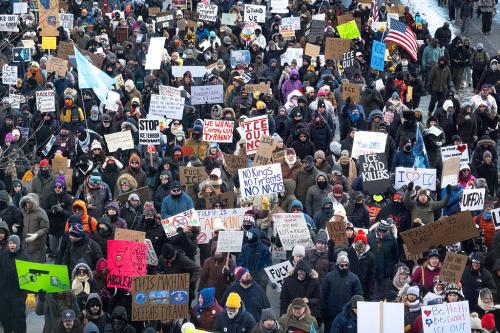
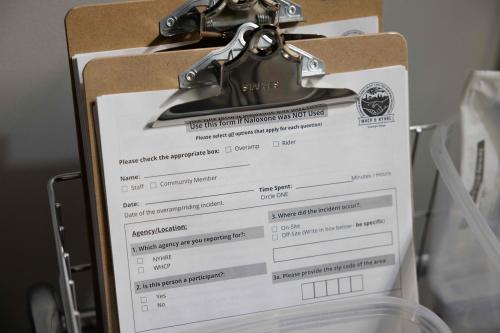
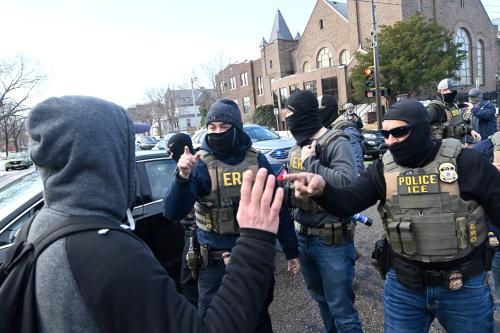
Commentary
On Super Tuesday, Trump’s fate rests with ghost delegates
March 1, 2016